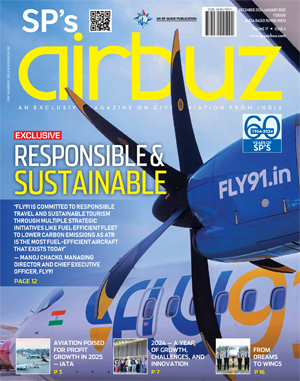Industry Profit Globally to be over $39.4 Billion in 2016
In an interview Tony Tyler, Director General & CEO, International Air Transport Association (IATA), highlighted the outlook for airline’s financial performance, how the industry is fairing on the safety front, climate change agreement at ICAO and why the industry is being so proactive on this issue, how governments can be more aware of the benefits of supporting aviation, etc.

Q: What’s the current outlook for airline’s financial performance and what are the factors?
A: We are forecasting improvement in performance of 2016 over 2015. We are looking for an industry profit globally this year from $39.4 billion, which will be a record level. Of course the low fuel price is helping but overall the industry is in a more zillion condition than it was some time ago and it’s in a better structure, the load factors are up using more efficient equipment, so generally speaking despite certain economic background the airlines are producing some good results.
Q: Safety is obviously top-of-mind right now. How is the industry fairing on this front and what is IATA doing?
A: Overall, it’s a very safe time for the industry, I mean last year’s safety performance beat the five-year average and although of course we had a couple of terrible tragedies last year which were not accidents they were caused deliberately by human action. What we’re doing as IATA is we are tightening up our IATA operations safety audit which has become a global benchmark and safety management for some 400 of the world’s top airlines. That’s now becoming a system of continual assessment and a continual safety management rather than just a snapshot every couple of years and we are encouraging governments all around the world to adopt it as a part of their regulatory regime.
Q: Security has made the news in the United States recently, but is an ongoing issue after the Brussels attacks. What more needs to be done on this?
A: Of course government in the short time needs to make sure they’ve got enough resources to keep the passenger lines moving. In the medium term though what we need to do is prevent these lines from happening in the first place and we have a programme, we call smarter security which aims to do that by working with the airports. We are working with Airports Council International to implement new technologies to visualise all risk based systems of security screening so that we can actually get rid of these lines altogether by doing thing a bit smarter. We need to improve facilitation at airports, we need to go for more alternative systems, and we need to make sure that everybody can have his boarding card on his mobile phone or print it out at home so he doesn’t have to queue up at a check-in desk. Home printed bag tags, we now have a standard for those, we are trying to get those adopted so that people won’t be queuing up to drop their bags off, the bag will already be tagged before they even get to the airport. If we can reduce the amount of congestion, the amount of queuing, we will also reduce the vulnerability of airport crowds, to terrorist outrages like we saw in Brussels.
Q: How confident are you of the climate change agreement at ICAO and why is the industry being so proactive on this issue?
A: The industry wants a global market base measure to help manage its carbon emissions. It wants that because really that is its licence to grow. This industry needs to grow, it wants to grow, but we have to manage our carbon emissions which is why we have set the target of carbon neutral growth from 2020. To deliver that we need governments to deliver at ICAO in its tri-annual assembly in September-October this year. How confident am I? Well, I’m hopeful, I’m also reasonably confident but there is a lot of work to be done to bring governments into alignment before we can say with 100 per cent confidence that we going to get that.
Q: One of your personal favourite topics is aviation being seen as a force for good. How can governments be more aware of the benefits of supporting aviation?
A: The airline industry makes today’s modern life possible. We enable so much in the way of economic development and social development. It’s impossible to think of an industry in any country that isn’t affected by aviation, doesn’t depend on aviation. There’s more than that, it is also the lifeblood of social development and interaction. I mean not just for people who want to go on a holiday, although that’s really important, but for families to stay connected, for businesses to stay connected, for people. People want to explore the world and its aviation that makes that possible so in all these ways this aviation is a huge force for good.





